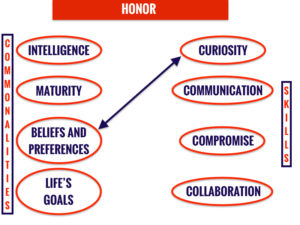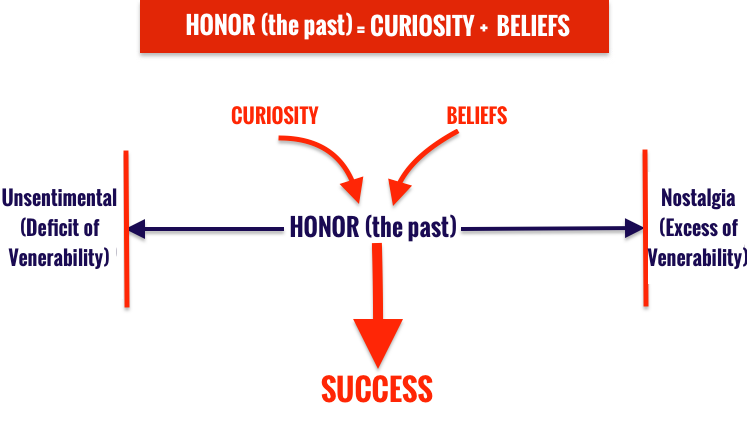Honor is a combination of the skill of curiosity with the trait of beliefs. Curiosity, you may remember, is largely composed of the core psychological skill of Observing Ego, paired with an educated eye, full of "left brain" ability for detail, history, and organization. Beliefs, you may recall, pertain to ideas that we deem to be true and valid, and yet carry such a large degree of emotion in them, that they are valued by us, and become such a part of our decision-making strategies, that they are far more than just ideas. We think of them as "truths" in part, because they also emerge as a function of our very identity. Honor has bearing on our performance in phase three - intellectual attraction - step eight, where we seek to amplify the best virtues toward our goals.

Our beliefs, as we have said, are our “worldview” or sense of “reality.” When a couple gets together and are very agreeable to most of what their partner says, we find that they may end up giving each other erroneous feedback about the world around them. It is inaccurate “reality testing,” which leaves them more confused in being together than in being alone and single. This is the intellectual experience of “codependence,” in which the couple lives on a sort of socially isolated island unto themselves. Forced to "have the same beliefs" without ever really examining them, based on the actual results of the past.

They make the relationship an intellectual prison of their own building, the blocks that form the walls made of the absence of curiosity, and the mortar between them made of prejudice and ignorance. They are blind to seeing their constant agreement as the real impediment to love lasting for a lifetime, because the soul of all people will eventually declare itself as existent, one’s own world, and secondly, unique, even in the arms of another. Their “distasteful agreeableness” is a powder keg which will most assuredly explode someday, probably when they would have been better served to have a strong partnership in the face of an obstacle.
We need to remember that like any virtuous psychological trait that falls on the Golden Mean, there is also a correseponding set of two vices - one of excess, which is Nostalgia, and one of deficit, which is the state of being Unsentimental. Instead of agreeing with everything the other says, they both need to have the honor to help each other correct their own, faulty beliefs, through a sense of curiosity about the results of the past, not hostility or resentfulness about it.
In this way, they may naturally counter the "Pollyanna" effect of Nostalgia - whitewashing the past, to pretend that everything has always been all nice and perfect, and causing them to miss the crucial lessons of failure (how can we improve as a couple in the future if we never objectively look at the past, honorably, and to honorably correct it in a spirit of kindness.) This move also works on the overly, exceedingly optimistic belief systems of both partners.
Likewise, if we don't counter what is utterly unsentimental, and essentially pessimistic about one or both partners, by honoring the truth of the past, that it really wasn't all bad, and to see even those failures as a chance to balance out into more optimism than pessimism about it all. To use boundary doors on the couple's history, to honorably look at and correct the failures of the past, but also to honor the successes as a foundation on which to build.
When thinking of using this character virtue in yourself, or seeing it in others, you need to remember that it is just as easy to find someone so nostalgic, that they don't get anything productive done, in themselves, or in service of the relationship. You can see how directly it is, that curiosity operating on our beliefs as a couple, to keep them balanced between too much optimism versus too much pessimism, really is honoring the other person, and our individual and shared, "pasts." It is in this curious, fair, kind way that we prevent each other from being "revisionists" who "twist the past" in arguments, into what it really wasn't, so that we can have an honestly successful joint future.

